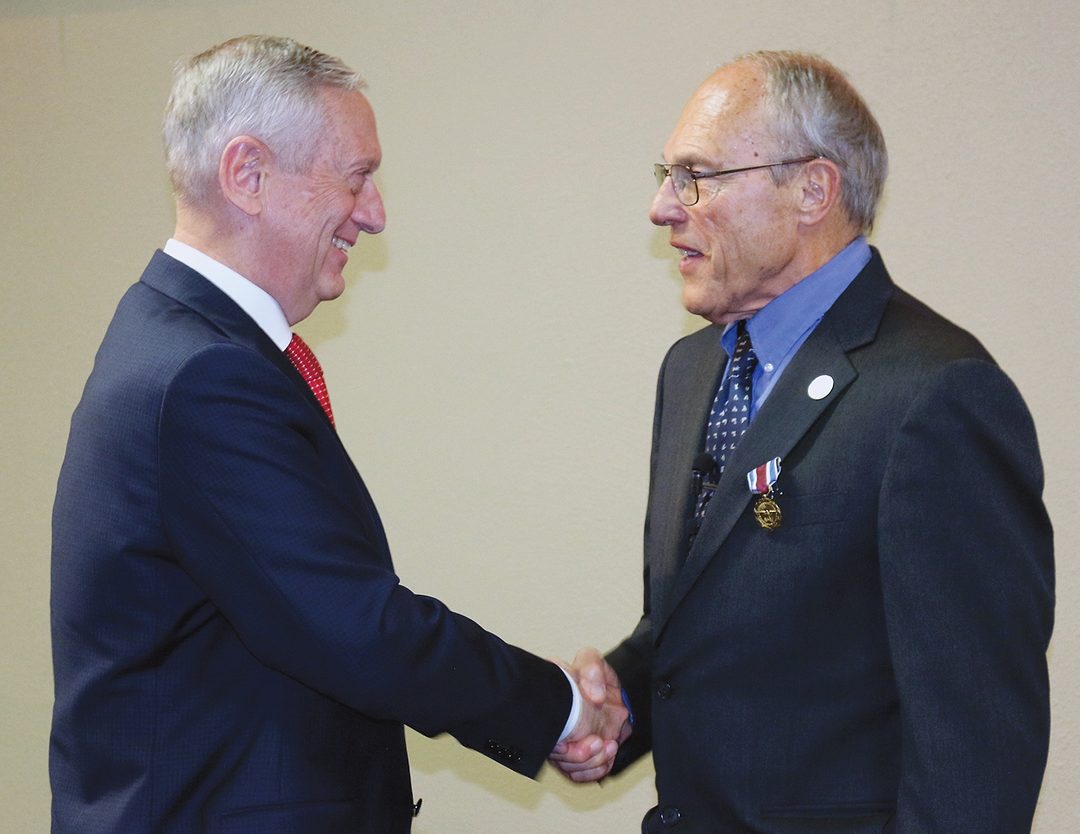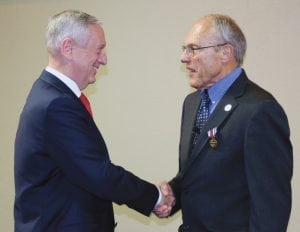
Home » Defense secretary honors Richland surgeon with public service medal
Defense secretary honors Richland surgeon with public service medal

March 14, 2018
A Richland doctor’s legacy across the globe for treating trauma fractures in impoverished countries recently earned him a federal public service award.
Secretary of Defense James Mattis, a Richland native, presented the Department of Defense Medal for Distinguished Public Service to Dr. Lewis Zirkle on Feb. 26 at SIGN Fracture Care International’s north Richland headquarters.
“Some things in all of our lives are work and some are pleasure, and this is a humbling pleasure — a humbling honor — to be here for this,” Mattis said. “It’s unique, obviously, for a Richland guy to be honoring a Richland guy.”
Nominees for the award must have provided service to the Department of Defense “at considerable personal sacrifice and inconvenience … motivated by patriotism, good citizenship and a sense of public responsibility.”
Zirkle, founder and president of SIGN, was recognized for his significant contributions to improving the field of orthopedics in developing countries.
“This is only the latest chapter in what was a self-assigned, never-ending mission for you, Doc,” Mattis told Zirkle.

Since 1999, SIGN has treated more than 210,000 patients in 50 countries, educated more than 5,000 surgeons and launched 330 SIGN programs.
SIGN’s stainless steel nails, used to mend and connect broken bones, are manufactured in north Richland.
Typically, Department of Defense medals are awarded to those who have worked directly with the most senior officials of the federal government.
However, in Zirkle’s case, SIGN CEO Jeanne Dillner said she submitted the nomination, and within five minutes, Mattis responded with a resounding “Yes,” and began making plans to travel to Richland.
Zirkle’s work as an Army orthopedic surgeon during the Vietnam War inspired him to embark on his mission to educate and equip surgeons in developing countries and conflict zones with the tools and knowledge they need to treat patients and raise them and their families out of poverty.
It all started with a 10-year-old Vietnamese boy whose leg had been rendered useless by serious Napalm burns. He couldn’t walk, but Zirkle was able to treat the complex injury and restored the leg’s functionality.
“As he walked away with his father, I looked at the mango that his father had given me, with a thumbprint still in it, and I thought, ‘This is the best gift I’ve ever received,’ ” he recalled.
After the war, Zirkle established his own orthopedic practice and then launched SIGN, devoting a lot of his time to visiting clinics in third world countries to educate surgeons and analyze the 200,000 cases in the SIGN database, the only orthopedic database of its kind in the world, to identify new ways to better treat disadvantaged patients.
Putting others first is the theme of Zirkle’s life work, Mattis said, calling the Richland doctor a “home run of a human being.”
“You are part of the power of inspiration. You are part of the reason America will stay a great country because you prove we’re a very, very good country. We are obviously proud, the Department of Defense, to say, too, that your unfailing sense of kindness and purpose grew out of the trauma of the work,” Mattis said.
In addition to the Department of Defense medal, Zirkle received a gift from his former colleagues at Northwest Orthopaedic and Sports Medicine and the Tri-City Regional Surgery Center of a photo from his days as a surgeon in Vietnam, accompanied by a plaque thanking him for his service.
“Distinguished is not something you should seek,” Zirkle said. “I’m very humbled by this.”
The nonprofit SIGN, which operates on a $5 million budget, relies heavily on donations to continue to diversify its programs and support the ongoing growth of 30 new SIGN programs per year. Tax-exempt donations to SIGN may be made through its website at signfracturecare.org.
Local News
KEYWORDS march 2018




